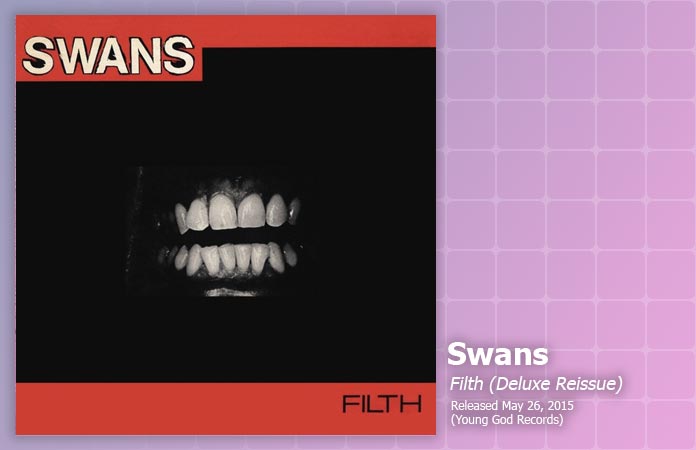Music Review: Swans, Filth (Deluxe Edition)
Published on June 12th, 2015 in: Current Faves, Music, Music Reviews, Reissues, Retrovirus, Reviews |Since Michael Gira’s band, Swans, has come back onto the scene, they’ve garnered more critical acclaim than ever, and new fans are running alongside the bandwagon, flailing arms up in the air, and hoping to swing aboard. Now that Swans debut album Filth has been remastered and re-released as a special three-disc set, this is a perfect opportunity for new fans to climb on up and get acquainted with the old stuff.
In fact, it seems like this release was completely designed for that “new fan” demographic. This may disappoint long-time fans of the band, especially when they hear what Filth sounds like remastered.
Filth is an album to be feared; it’s not for the faint of heart in the least. If you’ve never heard it, imagine just for a moment the sky darkening, the air growing heavier and thicker until finally, the heavens open and hot mud rains down upon your upturned face, filling your mouth and ears with grime and fire and hate.
Now, Filth has been cleaned up. The mix is clearer, more distinct, and Gira’s vocals are no longer buried. This is fantastic for people who really want to get a grip on what kind of musicianship is going on in the band. Each bass note feels like a power line vibrating. Every snare hit sounds like a bear trap going off. It sounds better, but the overall experience is lessened. People who have been listening to Filth since its initial release in 1983 may be initially interested in the new mix, but in the end, that sense of oppression and the desire to move to the back of the room before being trampled is gone.
Don’t misunderstand: Filth is an essential album. There’s still nothing quite like the full-on grimness of songs like “Stay Here,” “Freak,” and this writer’s personal favorite, “Power for Power.” Nor can we dismiss the idea that this writer is a curmudgeon, a guy who likes the old stuff to sound like the old stuff.
To that end, this writer’s opinion is that the remastering cuts the balls off the record.
The other two discs fare better. The second disc is the expanded version of City to City, Job to Job, including a nine-minute long rendition of “Raping a Slave,” recorded live in Berlin. Disc three includes the original Swans EP and a bunch of live tracks recorded in the early Eighties.
City to City, Job to Job is a compilation disc of bits and bobs, B-sides and live tracks. The live tracks are better because they have a raw energy that can’t be replicated in a studio. The studio tracks almost feel like proof of concept works, while the live bits are the real things. It’s like the wireframes compared to the full-sized model.
The same goes for disc three, where the studio EP is just fine, but doesn’t compare to the live tracks that follow it. Songs like “Howling Red Sheet” and “We’ll Hang for That” take on menacing new lives of their own in the live versions.
There is great value in the deluxe version of Filth, especially since you’re getting two studio albums, an EP, and 15 live recordings of varying quality in one set. There’s no such thing as a bad Swans album. Some are less accessible than others, and as a whole, the band’s catalog fits into what Laurie Anderson called “Difficult Listening Hour,” but there’s not a bad record in the bunch. Swans have reached the point where their older albums serve as historical documents. Everything they’ve done demands to be heard.
If you are new to the blackened glory that is Swans, this is a great place to join the club and gain some important musical knowledge. If you’ve been into them for a while, be warned that the bonus discs may have you double-dipping without realizing, and that a cleaner Filth really isn’t Filth.
Filth: Deluxe Edition was released by Young God Records on May 26.

Time limit is exhausted. Please reload the CAPTCHA.